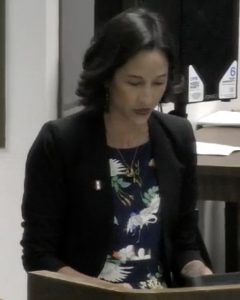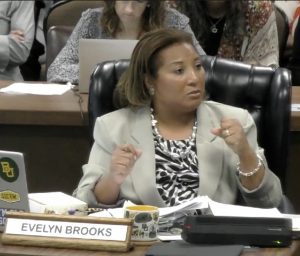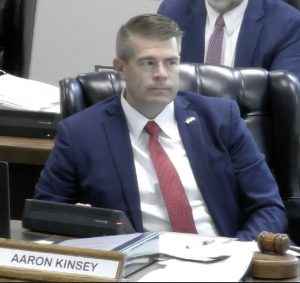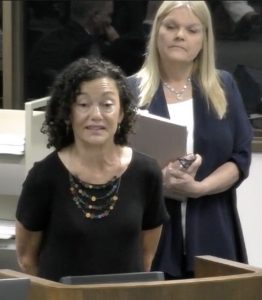Recently I traveled to Austin, Texas, to testify against the new curriculum proposed by the Texas Education Agency. This curriculum was orchestrated by TEA’s Commissioner, Mike Morath, whom Texas. Gov. Gregg Abbott hand-picked to lead the agency.
Morath has refused to disclose who the writers are for the new $84 million curriculum, citing Abbott’s 2022 renewed COVID-19 declaration. That declaration eliminated the need for the TEA to maintain a paper trail, so it looks like Texans never will know who wrote the curriculum.
The proposed curriculum includes lessons and Scripture lifted from the Protestant Christian Bible and presents the stories as literal, historical truths.
As I said in my testimony before the Board of Education, “It’s clear in reading the curriculum that those who wrote it have a distinctly fundamentalist Christian view of both the Bible and American history. I don’t want my 8-year-old or anyone else’s kid indoctrinated into that worldview.”
I was not the only one to express this sentiment during the public comments to the mostly hostile board.
84% testifying against
Of the 103 individuals who signed up to give testimony, 87 spoke in opposition to the curriculum and 16 for it (84% against, 16% for).

Susan Nayak
One of the first speakers, Susan Nayak, expressed what so many in the room feel about the curriculum. Through tears she said: “I strongly oppose adopting this curriculum. I’m sorry. This is very emotional to me. This was awful going through the curriculum. There are so many instances here that were bad — just outright bad as a parent wanting to bring my child up in a way that is moral and ethical but not necessarily in the exact Christian faith in these materials. It was appalling to go through it.”
Nayak went on to point to one example among many that so many of us find offensive: the use of Martin Luther King Jr.’s Letter from Birmingham Jail to make the point that “there must be law and order even if the laws are unjust” before leading into an entire lesson on the biblical book of Daniel.
At the end of her testimony, when Nayak said these stories are inappropriate for public school elementary students, one of the board members was caught on mic saying: “Not appropriate for children. Wow.”
Parental rights?
Several of the Jewish speakers pointed out the incredibly tasteless and emotionally violent recommended “game” included with the curriculum’s story of Queen Esther. Setting aside that the story in the curriculum does not match the biblical story, one recommended activity has the teacher explain what the historical game of “casting lots” was — and in the case of this lesson, to decide who would live or die. The suggested activity then has each student roll dice to see what their fate is.

Kimmie Fink
One speaker, Kimmie Fink from Liberty Hill, whose background is in education and curriculum development, also spoke of how the curriculum violates her right as a parent to raise her own children. As a military wife and a devout Catholic, Fink emotionally and eloquently testified: “We do not need nor do we want our children to receive biblical instruction in their public school. As parents we have the right to control the faith messaging that our children receive without interference from the government. … Elementary children are too young to distinguish between secular material and faith claims. Furthermore, the curriculum fails to prove a clear secular purpose for inclusion of biblical reading.”
Shortly thereafter came a series of exchanges that serve as case studies for what is happening in our wider political sphere and in our individual school districts. Specifically, the attempts by a powerful minority to silence the majority.

Evelyn Brooks
First, several of the rightwing members tried to censor one of their own colleagues, Evelyn Brooks, a moderate Republican, for asking too many clarifying questions of individuals who were testifying. Evidently each member only received 10 minutes to ask questions of the more than 100 individuals testifying and Brooks had spent hers asking clarifying questions of the professional educators offering testimony on the negative impacts of the pedagogy behind the new curriculum.
Another moderate Republican, Patricia Hardy, came to her defense and asked that Brooks be given additional time. There was a vote, and she was allotted an additional 10 minutes for use during the day.
Then, one of the board members who had gone after Brooks, Audrey Young, asked condescendingly, “Do we have a board operating procedure that asks testifiers to not repeat information that’s been previously submitted in their testimony so that we don’t have to hear the same thing over and over and over and over and over and over again today?”

Aaron Kinsey
The board chair, Aaron Kinsey, responded, “Yes. So I do have that one up and so it is 2.10 A3 — ‘the presiding chair will take appropriate action to avoid unduly repetitious testimony.’” Kinsey then said to the packed room, “I would like to encourage testifiers to bring unique perspectives as much as possible. … The board chair will do the best he can to keep us from being repetitious.”
Clearly the Board of Education conveniently forgot about freedom of speech in a session solely dedicated to public comments.
Rewriting history
Shortly thereafter, Cindi Castilla, a volunteer with the rightwing group Texas Eagle Forum, testified in support of the new curriculum. During questioning with the board, Castilla, who does not have a background in education, called the curriculum “a game changer.” She went on to state: “There’s so much richness in biblical literature and nine out of 10 homes have a Bible in them in America.”
Board member Staci Childs responded: “I read about some of the text passages that spoke about the first patriots. And some of the passages said it was because of ‘his faith in God’ that he was able to be successful in ‘saving the country.’ You don’t think that that sends a message to kids that they also need to have faith in God to be successful?”
Without skipping a beat, Castilla responded: “I think that’s historical. I think our founders credited God to the foundation of our country — to the way they set us up. They credited God and so you’re teaching what they believed.”
Childs pushed back: “I was specifically asking about the inferences the kids may make because of that teaching. You don’t think that the kids would make that inference — that they have to have faith in God in order to be successful in their journeys?”
Castilla responded: “No, I think their parents are responsible for whatever religious teachings they want to do at home. And, you know, our history’s our history and I’m good with that.”
Board member Rebecca Bell-Metereau asked Castilla: “How do you square this with the Establishment Clause, which provides for separation of church and state?” To which, Castilla delivered the standard rightwing extremist line: “First of all, separation of church and state comes out of the Danbury Letter. It is not saying that we don’t have religious history. We do have a lot of history in the Christian religion in our country. I mean, our laws are based on Western tradition.”
Antisemitism

Nancy Kasten
This argument over truth and history continued when my colleague at Faith Commons, Rabbi Nancy Kasten, was questioned by board member Tom Maynard about how the curriculum includes antisemitic tropes and leads to the alienation of students who do not adhere to fundamentalist Christianity.
The 6-minute exchange is truly shocking and worth watching in its entirety, but the key to the exchange is here:
Maynard played dumb and said, “When you speak about ‘antisemitic’ language — can you be a little more specific about some specific antisemitic language that you’re citing?
Kasten responded, “Well, there are references to Jews and to Hebrews and to Jewish communities in other countries than the Holy Land, in Rome that portray Jews as opponents of Christ, as — also there are images of Jews as being very preoccupied with money and other images that have been used with —”

Tom Maynard
Maynard interrupted her saying, “OK. By the way, there are certain things that are historical. You know, this is that — you know, the Apostle Paul was dragged out of town by the Jews and stoned, and I mean those are facts.”
How are those of us who do not take the Bible as a literal, historical factual account to respond to those in positions of governmental power who do? This was the kind of tyrannical scenario the framers of the Constitution drafted the First Amendment to buttress against.
Texas shows the danger
By now, most Americans are waking up to the fact that Christian nationalists have embedded themselves in all spheres of influence as part of their Seven Mountains Mandate. Boards of education are just one of the places where these extremists are attempting to control the narrative about America’s founding and the historicity of the Protestant Bible.
Those of us committed to a thriving, pluralistic democracy must urgently speak up and push back against these dangerous narratives about past in order to ensure that we maintain religious liberty for all in the future.
For, as George Orwell wrote in his novel 1984: “Who controls the past controls the future. Who controls the present controls the past.”

Mara Bim
Mara Richards Bim serves as a Clemons Fellow with BNG and as program director at Faith Commons. She is a spiritual director and a recent master of divinity degree graduate from Perkins School of Theology at SMU. She also is an award-winning theater artist and founder of the nationally acclaimed Cry Havoc Theater Company which operated in Dallas from 2014 to 2023.
Related articles:
Texas Board of Education gets huge pushback on religion-infused curriculum
Proposed new Texas school curriculum infused with Bible stories